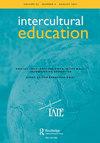葡萄牙学校跨文化教育的政策与实践
IF 0.8
Q3 EDUCATION & EDUCATIONAL RESEARCH
引用次数: 1
摘要
跨文化教育侧重于人们之间的互惠关系和对话,在对不同文化有共同理解和欣赏的背景下。葡萄牙北部地区正在成为移民和难民的接待地区。本文旨在了解该地区的学校是如何制定跨文化政策和实践的。这项研究基于从波尔图大都市区的13所学校收集的数据。我们首先分析了130个学校教育项目和年度活动计划。选择了13所在多样性、融合和跨文化方面有前景的学校,对学校领导进行了采访。对文件和访谈的内容分析结果表明,学校普遍关注所有学生的融合,但没有特别关注少数群体。人们不认为多样性值得特别关注,因为它被认为已经融入了学校的日常生活和人际关系中。同时,跨文化教育价值观存在于学校领导的政策层面话语中,而较少存在于跨文化实践层面的话语中。本文章由计算机程序翻译,如有差异,请以英文原文为准。
Policies and Practices on Intercultural Education in Portuguese Schools
ABSTRACT Intercultural Education focuses on reciprocal relationships and dialogue among people, in contexts where there is a shared understanding and appreciation of different cultures. The northern region of Portugal is becoming a host region for migrants and refugees. This article aims to understand how intercultural policies and practices are being developed in the region’s schools. The study is based on data collected from 13 schools, located in the Metropolitan Area of Porto. We started by analysing 130 School Educational Projects and Annual Plans of Activities. Thirteen schools, with promising approaches on diversity, integration and interculturality, were selected for conducting interviews with school leaders. Results from content analysis of documents and interviews indicate that schools share a general concern about the integration of all students, but do not particularly address minority groups. Diversity is not deemed worthy of particular attention, since it is believed to be already integrated into school everyday life and relationships. Simultaneously, Intercultural Education values exist in policy-level discourses of school leaders, but less in the discourses at the level of intercultural practices.
求助全文
通过发布文献求助,成功后即可免费获取论文全文。
去求助
来源期刊

Intercultural Education
EDUCATION & EDUCATIONAL RESEARCH-
CiteScore
2.30
自引率
8.30%
发文量
36
期刊介绍:
Intercultural Education is a global forum for the analysis of issues dealing with education in plural societies. It provides educational professionals with the knowledge and information that can assist them in contributing to the critical analysis and the implementation of intercultural education. Topics covered include: terminological issues, education and multicultural society today, intercultural communication, human rights and anti-racist education, pluralism and diversity in a democratic frame work, pluralism in post-communist and in post-colonial countries, migration and indigenous minority issues, refugee issues, language policy issues, curriculum and classroom organisation, and school development.
 求助内容:
求助内容: 应助结果提醒方式:
应助结果提醒方式:


